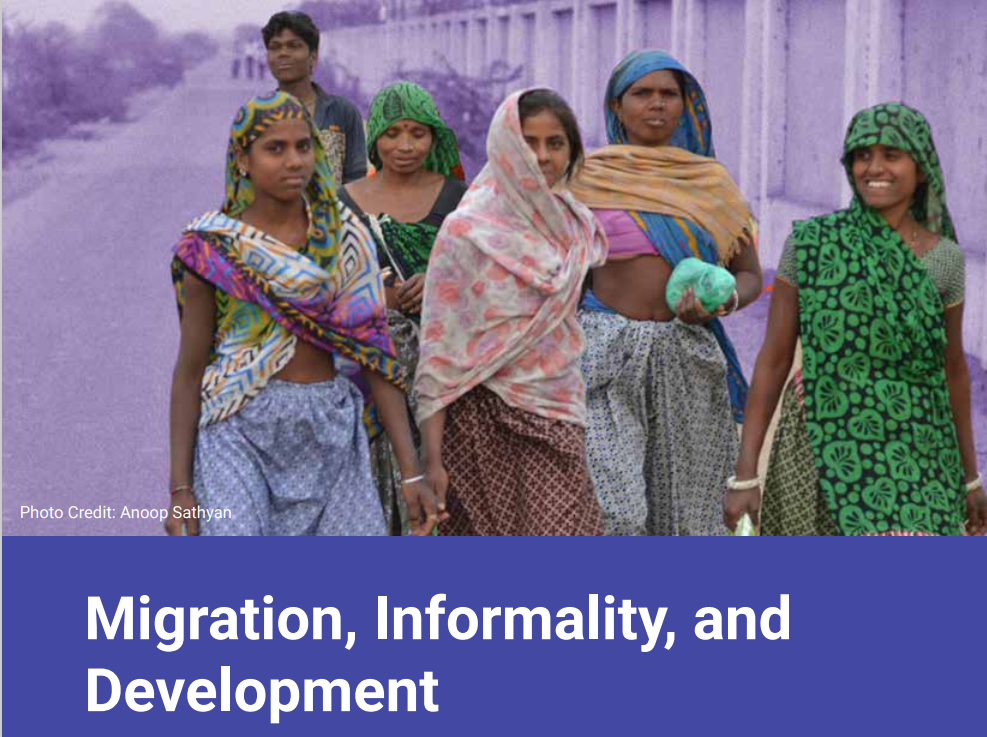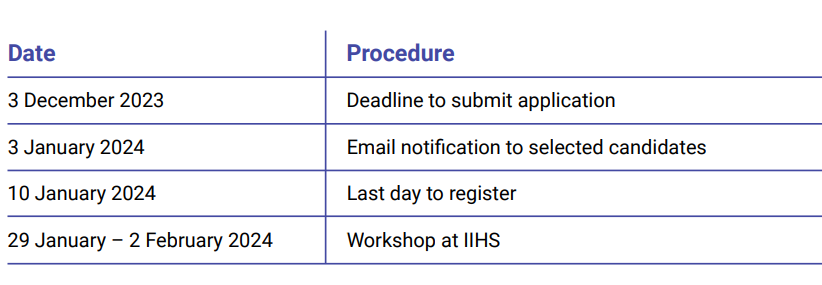Migration, Informality, and Development

![]()
Deadline to apply: 3 December, 2023 / Workshop Date: 29 January – 2 February, 2024
Aajeevika Bureau’s vision is to achieve an equitable and dignified world of work for labouring communities. We focus our work on the seasonal, circular migrant workforce – as this represents a vulnerable segment within the vast spectrum of informal workers. Our mission is to provide lasting solutions to economic and socio-legal problems of migrant workers by blending innovative services with policy, research, and advocacy. To this process it is core to enable strong workers’ organisations – of men and women workers – who are able to articulate and assert their just demands and offer a platform for solidarity to all in the world of work.
Work Fair and Free is a knowledge institution that is embedded in the community and practice of internal labour migration in India. We work at the intersection of knowledge, policy and praxis to achieve an equitable and dignified world of work for laboring communities. Building on years of grassroots action organizing migrant workers engaged in informal work, we undertake specialized knowledge initiatives including research and policy advocacy, teaching, training and capacity building, engaging with diverse stakeholders in the labour ecosystem.
The Indian Institute for Human Settlements (IIHS) is a national education institution and a prospective national university, committed to the equitable, sustainable and efficient transformation of urban Indian settlements. IIHS is a prospective independent national institution of eminence and innovation university focused on its urbanisation.
We are pleased to announce a 5-day workshop on *Migration, Informality, and Development* jointly offered by Aajeevika Bureau, Work Fair and Free Foundation, and the Indian Institute for Human Settlements (IIHS).
The workshop is open to early career researchers and development practitioners and will provide a nuanced understanding of internal labour migration in contemporary India and ways to contribute to an informed policy discourse, advocacy, research, and interventions that can improve the lives of migrant workers.
About the Workshop
The movement of people from rural to urban areas, between and within states, across sectors of employment forms a complex web that profoundly impacts India’s socio-economic landscape. The internal labour migration story is multifaceted and contradictory in many ways. While migration opens new opportunities for employment for many, it also pushes people into precarious work regimes.
Moreover, migrant workers from marginalised caste, class, and gender identities remain politically excluded at both source and destination. The labour legislation continues to weaken the workers’ claims to their rightful entitlements. The non-recognition of women’s productive and reproductive labour remains a critical barrier to their political empowerment and socio[1]economic well-being. The COVID-19 pandemic sharply visibilised the structural exclusions of migrant workers and simultaneously deepened the labour crisis.
At this juncture, Aajeevika Bureau, Work Fair and Free Foundation (WFF), and the Indian Institute for Human Settlements (IIHS) are pleased to organise a workshop on migration, informality, and development. The workshop endeavours to develop a deeper and critical understanding of internal labour migration in India, including the historical context, labour market dynamics, diverse experiences and vulnerabilities of the migrant workforce, exclusionary urban imaginations, and policy implications. We will analyse the legal regime on labour migration and the labour movement strategies for achieving a dignified world of work.
The workshop is open to early career researchers and development practitioners. It will provide a nuanced understanding of internal labour migration in contemporary India and ways to contribute to informed policy decisions, advocacy, research, and interventions that can improve the lives of millions of migrant workers.
The workshop will explore migration in India through various thematic intersections. Some of these include:
- Theoretical frameworks and empirical trends to understand contemporary migration
- Migrant workers and platform-mediated work
- Urbanisation and housing
- The relationship between caste, gender, and migration
- Occupational safety and health (OSH)
- Migration in the context of climate change
- Addressing precarious migration through advocacy, social protection policies, and worker collectivisation
The workshop will also draw on multiple methods to explain migration. Sessions will cover how to:
Use archives to historicise migration
- Apply qualitative methods to describe and understand contemporary migration
- Use public data sources to measure and describe migration patterns
- Spatialise migration through geographic information systems (GIS)
The workshop will be conducted entirely in-person and blend interactive lectures, group discussions, guided learning activities, case study analyses, data visualisation, map-based exercises, and film screening. Participants will receive a detailed workshop schedule, reading material and resources. Select faculty will also hold office hours during the workshop for participants to address their questions in a 1-1 or small group setting
Learning Objectives
- Understand theories and concepts underpinning labour migration studies.
- Critically examine the relationships between labour migration, informality, and exclusionary urbanisation.
- Explore policies and institutions on migration and labour.
- Learn about data sources and research methods to study migration
Workshop Anchors
This workshop is jointly offered by faculty members of IIHS and researchers and practitioners of WFF with decades of teaching and research experience. Guest speakers, including academics and practitioners, will share their expertise and insights.
The following faculty members will anchor this workshop:
Tara Nair Director, WFF | Aajeevika Bureau Divya Varma Director, WFF | Aajeevika Bureau Geeta Thatra Associate Director, WFF Divya Ravindranath Senior Researcher, IIHS Raghav Mehrotra Research Associate, IIHS
Cost: When: There is no fee to participate in this workshop. Participants will be provided with accommodation and food for the duration of the workshop. However, they are expected to arrange for their own travel to Bangalore, as well as local travel between the workshop and accommodation venues. Where: 29 January – 2 February 2024 IIHS, Bengaluru City Campus
How to Apply To apply, fill out and submit the Microsoft Form by 11:59 pm IST on 3 December, 2023. Applications received after this date will not be considered.

There will be a two-step selection process. Candidates will be shortlisted based on the application form, and a telephonic interview will be conducted with the shortlisted candidates to understand their motivation for joining the workshop.
Diversity Policy
Aajeevika Bureau, WFF, and IIHS aim to have a diverse cohort for this workshop and encourage women, people with disabilities and those from economically and socially excluded communities with the requisite skills and qualifications to apply.
Contact Information
If you have any questions about the application, please write to rmehrotra@iihs.ac.in and geeta.thatra@workfairandfree.org
Pls see link to download the brochure and apply for the workshop. https://workfairandfree.org/certificate-courses/

